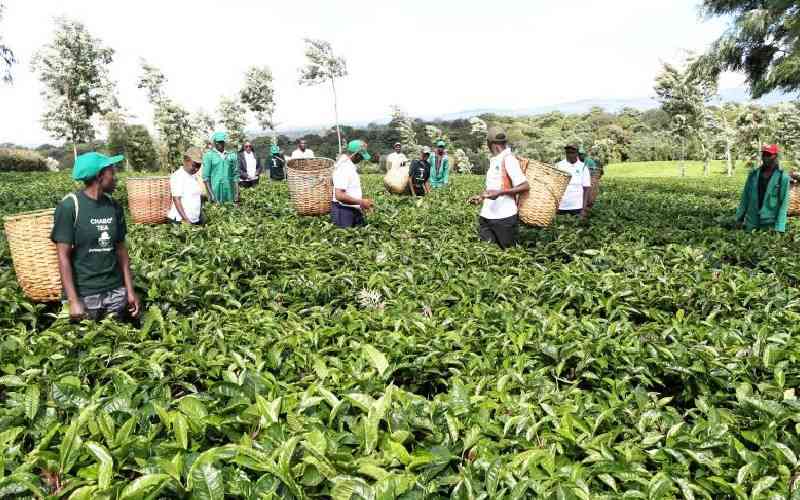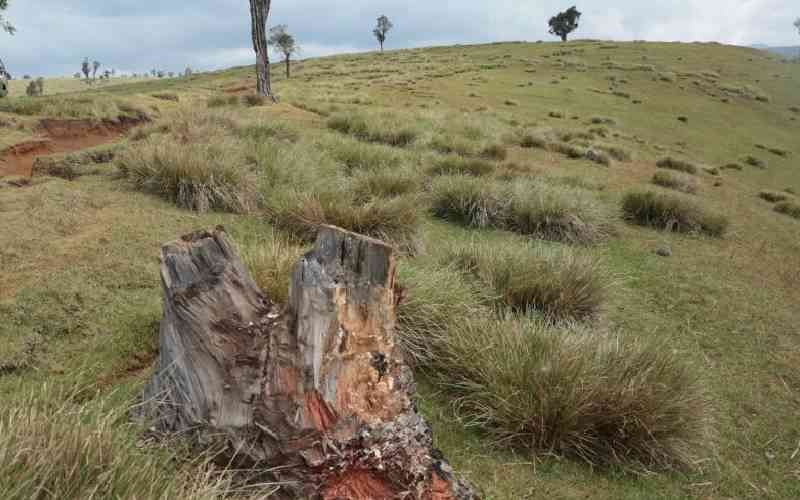
Tea sector in the country is staring at a major shake-up after Bomet County initiated a process of formulating its own laws to manage the production and sale of tea produce.
The move poses a litmus test for the industry which has been dominated by Kenya Tea Development Agency (KTDA) for decades.
Through a Bomet County Tea Bill 2015 currently before small-scale farmers to give their input a head of presentation before the local Assembly, the county plans to give more say to small-scale farmers.
The move which has received backing from small-scale farmers in the region to overhaul the law which has given monopoly to Kenya Tea Development Authority (KTDA) in marketing their produce for a long time.
The growers said laws governing the sector were skewed in favour of KTDA and that full liberalisation should be embraced in the sector so as to free farmers to sell their produce to private sector players.
"KTDA has underpaid small-scale tea growers and continues to impoverish them despite the fact the agency earns billions of shillings by selling tea in foreign markets," said Andrew Chepkwony, a small-scale tea grower.
Mr Chepkwony who led the farmers in making a raft of resolutions during meetings held yesterday at Kipyosit and Ndarawetta trading centres in Bomet East and Bomet Central constituencies said KTDA had abandoned its core mandate and engaged in other businesses to the detriment of the farmers.
The meetings were attended by Bomet Governor Isaac Ruto, Chief Executive in charge Agribusiness Alex kirui and his Trade counterpart David Cheruiyot.
Chepkwony said time had come for the small-scale tea growers to be freed to sell their produce to multinational tea companies which paid better for green leaf delivered as compared to KTDA.
Foreign markets
They proposed the establishment of an independent tea agency which will be used to market the produce in local and foreign markets.
Joshua Rono, a tea grower claimed that the farmers had been misled by the agency to sign contract forms which binds them not to sell their produce to rival companies. He also claimed that the agency was charging farmers exorbitant prices for the supply of fertilisers yet the same was sourced from cheap sources abroad.
Mrs Recho Osimbo said many small-scale tea growers had uprooted tea bushes and engaged in other income generating projects including rearing of livestock and horticultural farming.
"For years, the growers are unable to feed their families, educate their children and pay for medical bills as a result of the peanuts paid to them by the agency for delivery of green leaf to the various factories," she said.
Stay informed. Subscribe to our newsletter
Another small-scale tea grower, Edwin Maritim said the farmers should form co-operative societies and use the same to do value addition and market the produce.
The farmer said growers will move to court to challenge the monopoly enjoyed by the agency, noting that the laws governing the sector were skewed in favour KTDA and should be amended.
Full liberalisation
Governor Ruto concurred with farmers on the issues they raided and said full liberalisation must be allowed to thrive in the sector so as to enable the growers to make a profit from their investments.
He said the multilevel taxations in the tea sector has to be done away with and that the County government of Bomet would provide incentives for farmers so as to enable them produce enough food and cash crops.
"Levying of tea cess by KTDA and other unnecessary taxes should forthwith be scrapped so as to promote competitiveness in the sector," Ruto stated during the meetings.
"Rationalised taxation systems must be provided so as to attract and promote investments in the tea sector," he added.Tea is a major cash crop in Kenya and for a long time it was the leading foreign exchange earner.
 The Standard Group Plc is a
multi-media organization with investments in media platforms spanning newspaper
print operations, television, radio broadcasting, digital and online services. The
Standard Group is recognized as a leading multi-media house in Kenya with a key
influence in matters of national and international interest.
The Standard Group Plc is a
multi-media organization with investments in media platforms spanning newspaper
print operations, television, radio broadcasting, digital and online services. The
Standard Group is recognized as a leading multi-media house in Kenya with a key
influence in matters of national and international interest.
 The Standard Group Plc is a
multi-media organization with investments in media platforms spanning newspaper
print operations, television, radio broadcasting, digital and online services. The
Standard Group is recognized as a leading multi-media house in Kenya with a key
influence in matters of national and international interest.
The Standard Group Plc is a
multi-media organization with investments in media platforms spanning newspaper
print operations, television, radio broadcasting, digital and online services. The
Standard Group is recognized as a leading multi-media house in Kenya with a key
influence in matters of national and international interest.










